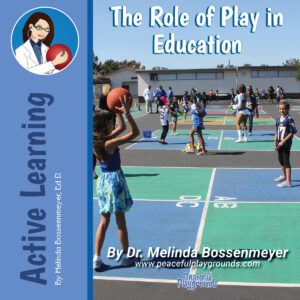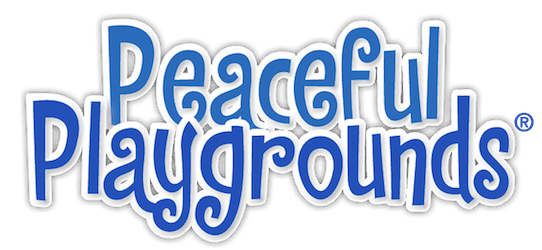The Role of Play in Education
Play is a child's way of learning.

Loose Parts Play
International Play Association:https://ipausa.org/
Play Things. Loose Parts Play in Good Times and Bad by Penny Wilson from PlayKX play sessions in the Kings Cross Development area of London. thier sessons use only loose parts and Playworkers and families who come along to play.
Play Things: Loose Parts Play download.

The Benefits of Outdoor Play and Childhood Obesity
This is a list of outdoor activities that children will find fun and they are active activities to get kids moving and working off extra pounds.

101 Ways to Play
Play Scotland. https://www.playscotland.org/
#3 Loose Parts Play
Use household items, creative and messy tems, metal, wood and sensory items for a variety of Ways to Play!
Indoor Play Ideas 1-10 , 101waystoplay-20-30.pdf , 101waystoplay-30-40.pdf

Active Animal Fun
An active checklist for #playeveryday from Play Scotland.Any animal ideas to share, let us know at in**@**********nd.org Fun for all the family. Can you………
Walk like an elephant- lace your arm in front of your nose like a trunk.
Hop like a Kangaroo.

The Case for Play – Playground Ideas
Multiple 20-40 year longitudinal studies have demonstrated a profound impact of play based interventions in the education and long-term life outcomes of children living in poverty. In addition, these interventions have resulted in significant economic gains both for the individuals and for society as a whole.
Research on play interventions show that play results in significantly raised IQs, greater levels of education attainment, higher rates of employment, and increased wages.
Playground Ideas-2015 Playground Ideas is an Australian Non-Profit Organization

Design for Play: A guide to creating successful play spaces.
Regular physical activity in childhood and adolescence is important for promoting lifelong health and well-being and preventing a variety of health conditions. School are in a unique position, regardless of learning mode, to help students attain the recommended 60 minutes of moderate to vigorous physical activity daily.
Play England "Making Space for Play". design-for-play-a-guide-to-creating-successful-place-spaces.pdf

Benefits of School-Based Physical Activity
Regular physical activity in childhood and adolescence is important for promoting lifelong health and well-being and preventing a variety of health conditions. School are in a unique position, regardless of learning mode, to help students attain the recommended 60 minutes of moderate to vigorous physical activity daily.
Download Benefits of School-Based Physical Activity. benefits-of-PA-infographic_draft.v4-large.png

Open up to Outdoor Mathematics
Regular Supporting children's developing problem solving reasoning and numeracy skills through good use of natural and man made materials in the outdoor environment.
Learning through Landscapes – early-years-mats-outdoors.pdf. https://www.earlyyearsoutdoor.co.uk/

The Critical Place of Play in Education
A Collaboration Between the US Play Coalition and the Association of Childhood Education International (ACEI)The Association for Childhood Education International (ACEI) recognizes the need for children of all ages to play and affirms the essential role of play in children's lives.
ACEI believes that as today's children continue to experience pressure to succeed in all areas, the necessity for play becomes even more critical. ACEI supports all adults who respect, understand and advocate legitimizing play as an essential pathway to learning for all populations of children. When working with children, adults should use their knowledge about play to guide their practice. (ACEI "Play: Essential for All Children" position statement)
US Play Coalition and Association of Childhood Education International (ACEI)

Managing Risk in Play Provision: Implementation guide
The Health and Safety Executive (HSE) recognizes the importance of play in children's lives and for their opportunities to learn about risk. HSE is pleased to commend the MANAGING RISK IN PLAY PROVISION: Implementation Guide. It's application of risk-benefit assessments is a sensible approach to the health and safety management of play provision.
Play England- Making space for play. managing-risk-in-play-provision-implementation-guide-vecjye.pdf. www.teachernet.gov.uk/publications

Mission Explore Outdoor Classroom
Outdoor classroom day is a global movement to get children outdoors at least once a day. Topic and lesson inspiration for all ages. This book proclaims to change the way your class sees the world forever. They suggest that you should not go any further if you are afraid of going on adventures or trying new things.
Get children outdoors to play and learn, on Outdoor Classroom Day.

OUT TO PLAY
A practical guide for creating outdoor play experiences in early learning and childcare.
The Scottish Government knows the importance of the early years of life for a child's development. That is why we have committed to expanding entitlement to funded early learning and childcare to 1140 hours/year by August 2020.
The Scottish Government. ou********@*ov.scot. OUT TO PLAY GUIDE

Physical Literacy and Play Training
This Physical Literacy and Play training offers workers and manager in the play sector the chance to learn more about why physical activity is so important to children and how we can do more to encourage it. The training, developed by Agile with support
from Inspiring Scotland and PEEK, brings together findings from national and international research that highlights the need
to increase children's levels of physical literacy as part of the long-term approach to increasing wellbeing and reducing levels of preventable disease.
GO2PLAY. Inspiring Scotland – PEEK – Agile -The Scottish Government.

Play for Wales Newsletter – Play in Schools
In a global study1 for Outdoor Classroom Day, 97 percent of teachers said that outdoor play is critical for children to reach their full potential, and 88 percent said that children are happier after playing outdoors.
Parents see the value and benefits of playtime, 84 percent said that they are against school playtimes being shortened or withdrawn for academic or behavioural reasons, and most importantly children say that playtimes are an essential part of the school day for them.

Play for Scotland – Playful Streets – Supporting Play in the Community
IFor many children, opportunities to play freely in their local communities are reducing. You may have noticed your child has less freedom than you had when you were their age, and perhaps you had less freedom than your parents' generation did.
There are many reasons for this including concern about traffic, worries about safety and pressure on resources. It is important to keep a sense of proportion about these risks as the result is
This Toolkit pulls together lots of tested ideas for communities to help them think about how they might work together to improve children and young people's play opportunities and in doing so, improve the environment for everyone.
Download Playful Streets Toolkit. Supporting Play in the Community.

The Playtime Revolution – Learning Through Landscapes
Developing school play times to support the curriculum and nurture happy,healthy children is the goals of the staff training resource guide form Learning through Landscapes.
Play is hugely important in almost every area of children's lives. It improves social skills, brain development and creativity whilst supporting emotional resilience, physical development, confidence and learning. Our early years colleagues have long understood the importance of play but if we're honest many schools do little to create the kind of rich play environments and experiences that can unlock these benefits for children.
This training guide has developed innovative approaches to enabling child-led outdoor play during school recess.
PRTM-Play-Coalition-White-Paper.pdf
Version: Feb. 2015
NOTE: if you have a popup blocker, please allow it permission to download the file.
Depending on your internet speed, your download should open in a new browser tab
between 3-10 seconds.
Details

